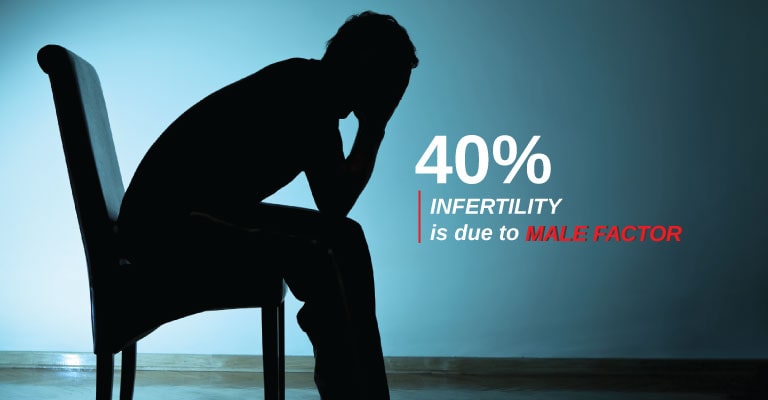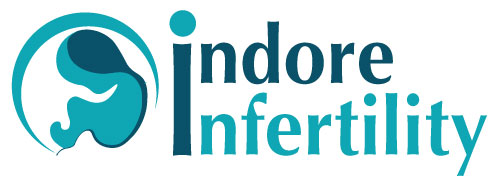
Male infertility is a common issue affecting couples worldwide. In India, male infertility is often overlooked as traditionally only the females are considered responsible for fertility. However, recent research suggests that male infertility contributes to almost half of all infertility cases. Understanding the statistics and causes of male infertility is crucial in addressing this common issue.
By raising awareness, promoting healthy lifestyle choices, and providing appropriate medical interventions, we can support individuals and couples in their journey toward parenthood.
What is male infertility?
Male infertility can be identified as the failure of a man to achieve pregnancy with his female partner even after a year of unprotected intercourse. Male infertility can arise due to different abnormalities ranging from an abnormality in sperm production, delivery, or sperm function which can lead to unsuccessful fertilization.
There are many more reasons for male infertility such as low sperm motility (asthenozoospermia), low sperm count (oligozoospermia), poor sperm morphology (teratozoospermia), genetic abnormalities, hormonal imbalances, erectile dysfunction, varicocele or ejaculatory disorders or structural obstruction in the male reproductive tract. Proper evaluation of the male partner by a male infertility specialist can help narrow down the cause of infertility and a choice of proper male infertility treatment can be made.
Main Causes of Male Infertility
There can be a single factor or multiple factors that lead to male infertility. We will discuss all these factors here and what infertility doctors prescribe for each cause:
- Sperm Production Problems: Problems like hormonal imbalances or genetic abnormalities, testicular infections, etc. can lead to poor sperm production. All these issues lead to abnormally low levels of sperm production.
- Varicocele: An enlargement of the veins within the scrotum, is a leading cause of male infertility, accounting for around 40% of cases. This condition adversely affects sperm quality and production. Research indicates that varicoceles are prevalent in 15% to 20% of men in the general population, but they can be effectively treated through surgical intervention.
- Semen Abnormalities: There are several semen abnormalities that include the low volume of Semen, abnormal or low sperm motility, or poor sperm morphology. These abnormalities can hinder proper fertilization.
- Erectile Dysfunction: Having difficulty in either achieving an erection or maintaining an erection, can lead to the ability to achieve conception. Some of the major factors that can lead to erectile dysfunction are anxiety, stress, or diabetes.
- Azoospermia (Non-obstructive and obstructive): Non-obstructive Azoospermia occurs when the sperm is absent in the reproductive tract due to issues relating to sperm production. Whereas, Obstructive Azoospermia occurs when the reproductive tract is blocked and this can hinder sperm ejaculation.
- Ejaculation disorders: Ejaculatory disorders can impact male fertility by hindering the release of sperm during ejaculation. Retrograde ejaculation is one such disorder where semen enters the urinary bladder instead of being expelled. Another ejaculatory disorder is premature ejaculation, characterized by uncontrollable and rapid ejaculation.
While premature ejaculation does not directly affect sperm production or quality, it can reduce the chances of successful conception if ejaculation occurs before proper sperm delivery. Both of these ejaculatory disorders can be evaluated and treated by male infertility specialists, with the aim of improving fertility outcomes for couples trying to conceive.
- Genetic disorders: Genetic abnormalities, such as chromosomal disorders and gene mutations can significantly impact male fertility. Conditions such as Klinefelter syndrome, Y-chromosome microdeletions, Kartegeners, and cystic fibrosis can interfere with sperm production and quality.
- Lifestyle Factors: Many lifestyle factors contribute to male infertility. These include smoking, excessive alcohol consumption, drug use, obesity, poor nutrition, and a sedentary lifestyle. Scientific evidence suggests that these factors can have detrimental effects on sperm count, motility, and morphology thereby reducing the likelihood of successful conception.
Consulting with a male fertility specialist can provide personalized guidance and appropriate interventions tailored to individual circumstances.
Importance of Expert Care:
When facing male infertility, consulting the best male infertility specialists, male fertility doctors or Andrologists is crucial. They possess specialized knowledge and experience in diagnosing and treating male infertility. They can conduct comprehensive evaluations, perform appropriate diagnostic tests and recommend personalized treatment plans tailored to your specific needs.
Finding the Best Male Infertility Specialists in Indore:

If you’re in Indore, it’s important to locate the best male infertility specialists or male fertility doctors who can provide the highest quality of care.
Try our Free Consultation Model once to meet one of the best Male Fertility Doctor in Indore, Dr. Gajendra Singh Tomar.
Treatment options for Male Infertility:
Male fertility specialists employ various treatment approaches to address the underlying causes of male infertility. These treatments aim to improve sperm count, quality, and motility, thereby enhancing the chances of successful conception. Some common treatment options include:
Medications: In certain cases, medications can be prescribed to address hormonal imbalances or other medical conditions that contribute to male infertility. Hormone replacement therapy may help if low testosterone levels are identified.
Assisted Reproductive Techniques: Assisted reproductive technologies, such as in vitro fertilization (IVF) or intracytoplasmic sperm injection (ICSI), are commonly used when the male partner has severe fertility issues. These techniques involve the collection and selection of sperm to facilitate fertilization and subsequent embryo transfer.
Surgical Interventions: Surgical procedures may be recommended to correct structural abnormalities that hinder sperm production or delivery. For instance, varicocele repair surgery can improve sperm quality by treating enlarged veins within the scrotum.
Sperm Retrieval Techniques: In cases where sperm is absent in the ejaculate due to blockages or other factors, sperm retrieval techniques like TESA or TESE can be employed. Procedures such as testicular sperm extraction (TESE) or percutaneous epididymal sperm aspiration (PESA) allow retrieval of sperm directly from the testicles or epididymis for use in assisted reproductive techniques.
Lifestyle Modifications: Lifestyle changes play a vital role in improving male fertility. Adopting a healthy diet, engaging in regular exercise, reducing stress, avoiding tobacco and excessive alcohol consumption, and managing weight can positively impact sperm quality and overall fertility.
Conclusion:
Male infertility is a multifactorial issue that can significantly affect couples trying to conceive. Understanding the causes and available treatment options for male fertility is crucial.
By seeking help from experienced male fertility specialists, individuals can explore personalized treatment plans that address specific underlying causes and increase the chances of a successful pregnancy. Remember, open communication, support, and professional guidance are key in navigating the journey toward parenthood.

